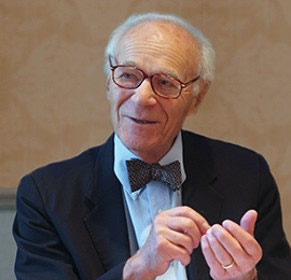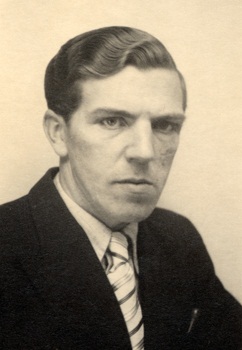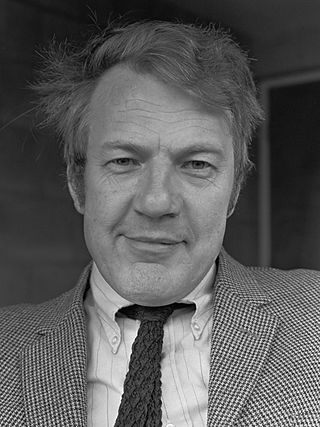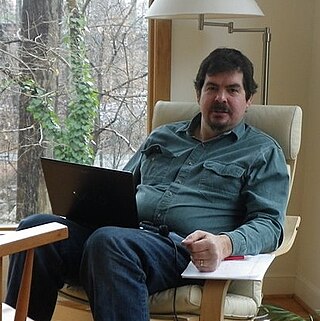Related Research Articles
Econometrics is the application of statistical methods to economic data in order to give empirical content to economic relationships. More precisely, it is "the quantitative analysis of actual economic phenomena based on the concurrent development of theory and observation, related by appropriate methods of inference". An introductory economics textbook describes econometrics as allowing economists "to sift through mountains of data to extract simple relationships". Jan Tinbergen is one of the two founding fathers of econometrics. The other, Ragnar Frisch, also coined the term in the sense in which it is used today.

Lawrence Robert Klein was an American economist. For his work in creating computer models to forecast economic trends in the field of econometrics in the Department of Economics at the University of Pennsylvania, he was awarded the Nobel Memorial Prize in Economic Sciences in 1980 specifically "for the creation of econometric models and their application to the analysis of economic fluctuations and economic policies." Due to his efforts, such models have become widespread among economists. Harvard University professor Martin Feldstein told the Wall Street Journal that Klein "was the first to create the statistical models that embodied Keynesian economics," tools still used by the Federal Reserve Bank and other central banks.

Trygve Magnus Haavelmo, born in Skedsmo, Norway, was an economist whose research interests centered on econometrics. He received the Nobel Memorial Prize in Economic Sciences in 1989.

Calyampudi Radhakrishna Rao FRS, commonly known as C. R. Rao, is an Indian-American mathematician and statistician. He is currently professor emeritus at Pennsylvania State University and Research Professor at the University at Buffalo. Rao has been honoured by numerous colloquia, honorary degrees, and festschrifts and was awarded the US National Medal of Science in 2002. The American Statistical Association has described him as "a living legend whose work has influenced not just statistics, but has had far reaching implications for fields as varied as economics, genetics, anthropology, geology, national planning, demography, biometry, and medicine." The Times of India listed Rao as one of the top 10 Indian scientists of all time. Rao is also a Senior Policy and Statistics advisor for the Indian Heart Association non-profit focused on raising South Asian cardiovascular disease awareness.
Mohammad Hashem Pesaran is a British-Iranian economist.

Christopher Albert Sims is an American econometrician and macroeconomist. He is currently the John J.F. Sherrerd '52 University Professor of Economics at Princeton University. Together with Thomas Sargent, he won the Nobel Memorial Prize in Economic Sciences in 2011. The award cited their "empirical research on cause and effect in the macroeconomy".
Arnold Zellner was an American economist and statistician specializing in the fields of Bayesian probability and econometrics. Zellner contributed pioneering work in the field of Bayesian analysis and econometric modeling.
Theory choice was a main problem in the philosophy of science in the early 20th century, and under the impact of the new and controversial theories of relativity and quantum physics, came to involve how scientists should choose between competing theories.
Onno Johan Boxma is a Dutch mathematician, and Professor at the Eindhoven University of Technology, known for several contributions to queueing theory and applied probability theory.
Jacques H. Drèze was a Belgian economist noted for his contributions to economic theory, econometrics, and economic policy as well as for his leadership in the economics profession. Drèze was the first President of the European Economic Association in 1986 and was the President of the Econometric Society in 1970.
The methodology of econometrics is the study of the range of differing approaches to undertaking econometric analysis.
Søren Johansen is a Danish statistician and econometrician who is known for his contributions to the theory of cointegration. He is currently a professor at the Department of Economics, University of Copenhagen and in the Center for Research in Econometric Analysis of Time Series (CREATES) of the Aarhus University. He has previously held positions at the Department of Statistics, University of Copenhagen, and the European University Institute in Florence.
Anil K. Bera is an Indian-American econometrician. He is Professor of Economics at University of Illinois at Urbana–Champaign's Department of Economics. He is most noted for his work with Carlos Jarque on the Jarque–Bera test.
Herman Koene van Dijk is a Dutch economist Consultant at the Research Department of Norges Bank and Professor Emeritus at the Econometric Institute of the Erasmus University Rotterdam, known for his contributions in the field of Bayesian analysis.

Wim Driehuis is a Dutch economist, Emeritus Professor Economics and Business at the University of Amsterdam.

Jan Salomon (Mars) Cramer was a Dutch economist, Professor of Statistics and Econometrics at the University of Amsterdam, known for his work of empirical econometrics.

Guido Wilhelmus Imbens is a Dutch-American economist whose research concerns econometrics and statistics. He holds the Applied Econometrics Professorship in Economics at the Stanford Graduate School of Business at Stanford University, where he has taught since 2012.
Anthonius Wilhelmus Johannes (Antoon) Kolen was a Dutch mathematician and Professor at the Maastricht University, in the Department of Quantitative Economics. He is known for his work on dynamic programming, such as interval scheduling and mathematical optimization.

John Philip Rust is an American economist and econometrician. John Rust received his PhD from MIT in 1983 and taught at the University of Wisconsin, Yale University and University of Maryland before joining Georgetown University in 2012. John Rust was awarded Frisch Medal in 1992 and became the fellow of Econometric Society in 1993.
George Garrett Judge is an American econometrician and Professor in the Graduate School in the Department of Agricultural and Resource Economics in the UC Berkeley College of Natural Resources.
References
- 1 2 "CV Hugo Keuzenkamp" at Hugo Keuzenkamp homepage, 2007.
- ↑ List of publications at National Library of the Netherlands.